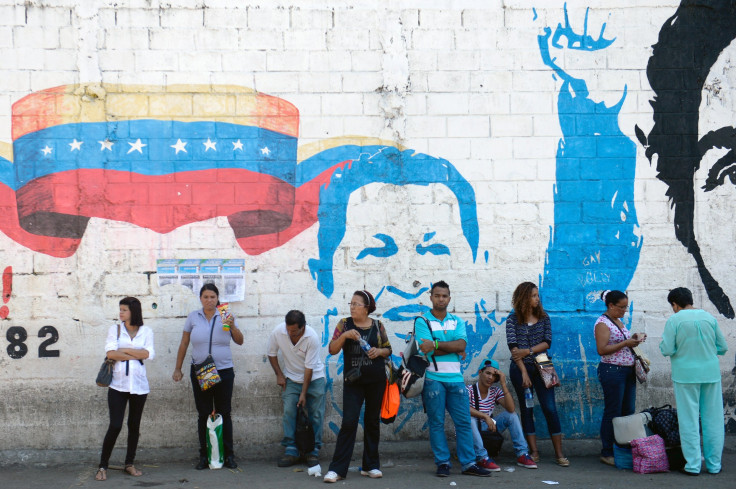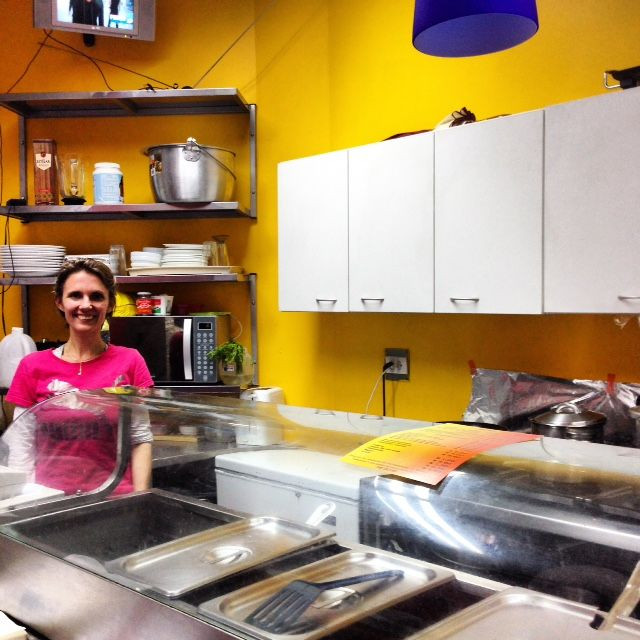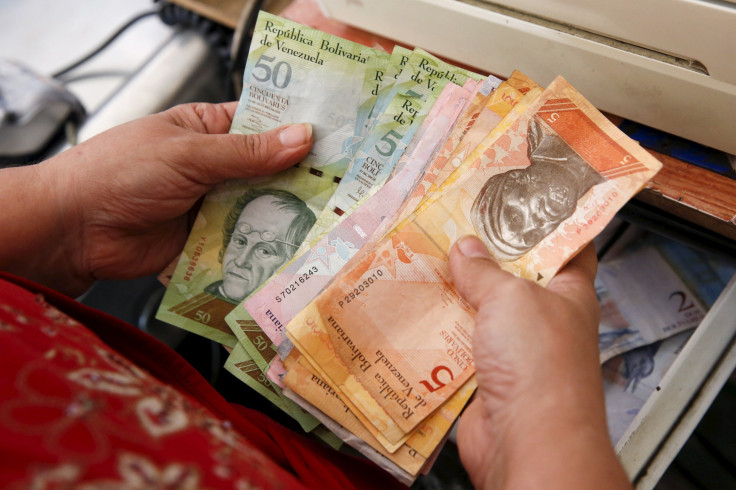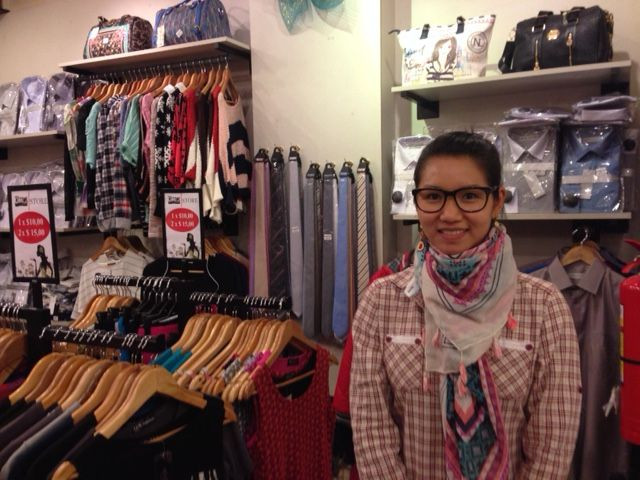Venezuela Elections 2015: Why Venezuelans Are Fleeing The Country

QUITO, Ecuador – Tendrils of smoke filled the air as Sarahay Toti flipped a spatula full of sizzling pork on the grill. It was a rainy Friday night, and there were few customers at the tiny shop where she made and sold arepas, a dish from Toti’s native Venezuela made of cornmeal patties filled with meat and cheese. But she was happy to take any business that came along.
This work was new for Toti, a 47-year-old mother of two who had held a well-paid job in human resources for most of her career in Venezuela. A year ago, she and her family sold off their house, car and most of their possessions to move to Ecuador, joining a rapidly swelling group of new Venezuelan immigrants there.
“I’ve met people here who are around 60 years old who have started from scratch from Venezuela,” she said. “It’s traumatic.”
Thousands of Venezuelans have been pouring out of their home country in recent months as it’s spiraled into ever-deeper crisis levels under the socialist administration of President Nicolás Maduro. Venezuela, home to the largest oil reserves in the world, became one of the world’s worst performing economies this year, with triple-digit inflation, severe shortages of basic household goods and soaring rates of violent crime propelling those who can afford it to leave the country. The festering crisis is set to hit a pivotal point Sunday, when Venezuelans vote in long-awaited parliamentary elections that could put the political opposition back into a seat of power for the first time since late President Hugo Chávez took office in 1999.
The opposition coalition has vowed to return the country to a sustainable path, and analysts say a victory for them could mark the beginning of the end for "chavismo," Chávez’s socialist ideology and policies that have dominated Venezuela for the past 16 years. But in the runup to the vote, the continuing exodus shows how desperate the situation has become. Venezuelan émigrés in places like Ecuador are arriving with only the possessions they can carry and no concrete plans for what will become of their lives.

Economic forecasts for Venezuela have been a nonstop string of gloom this year as slumping oil prices, on which Venezuela relies for 95 percent of its export revenue, have exacerbated rampant goods shortages and sunk its currency, the bolivar, to historic depths. Stringent price controls and increasingly scarce U.S. dollars make it hard for importers to keep products like milk or toilet paper in regular supply, so average Venezuelans wait several hours in line for a typical trip to the supermarket. Inflation has averaged around 159 percent this year, according to the International Monetary Fund. In a year when Latin American regional growth has slowed to a crawl, at just around 0.5 percent for 2015, Venezuela’s gross domestic product is projected to contract by a whopping 10 percent.
Salaries haven’t kept pace with the bolivar’s plummeting value. Maduro raised the monthly minimum salary by 30 percent in early November to 9,649 bolivars, which equals around $48 using the government’s weakest official exchange rate, 199 to the dollar. But Venezuela’s black market for dollars, generally considered the most accurate reading of the bolivar’s purchasing power, values a dollar at 890 bolivars, which means the newly increased minimum wage has risen to all of $10 a month.
That's why educated, middle-class families like Toti's have had to sell almost everything they own to afford to start fresh in a new country. In Ecuador, Toti said her business was slow and she was still trying to adjust to her unfamiliar new career. But she was earning enough for her family to survive, and life was still better than in Venezuela, where prices have surged by about 500 percent in recent months.
“I keep getting photographs from friends showing me current prices in Venezuela. I can’t understand how people live like that,” Toti said.
While the Venezuelan government doesn’t have official emigration figures, Caracas-based polling firm Datanálisis estimates that around 30 percent of Venezuelan citizens are making plans to permanently leave the country, compared to 4 percent a decade ago. Spain and the United States have traditionally been popular destinations for those who can afford to get there and secure visas, but Ecuador is becoming one of the newer hot spots for émigrés looking for relatively cheaper travel fare.
#Venezuela's exodus of people has reached record numbers https://t.co/rIJStQdjgb pic.twitter.com/IQbnhuUC3T
— dwnews (@dwnews) October 29, 2015
Ecuador doesn’t require an entry visa for most nationalities, including Venezuelans, so those who can afford to get into the country can simply arrive and start paperwork for a visa. While Ecuador hasn’t yet released migration figures for 2015, it saw more than 88,000 Venezuelans enter the country last year, compared to 64,000 in 2013.
Ana, a Venezuelan-Ecuadorian owner of a homestay in Quito who asked that her last name not be used to protect her guests’ privacy, said she began noticing a shift four months ago in the type of guests she was receiving. Venezuelans had come to stay with her before, but most of them were short-term visitors, often taking advantage of Ecuador’s use of the U.S. dollar to buy up foreign currency and resell it on Venezuela’s black market for a handsome profit. But now, most of them were coming to stay permanently.
“They come here very afraid,” Ana said. “They don’t know what is going to happen with their lives.”
One of her recent arrivals, 33-year-old Kikkito, who asked that his last name not be revealed because his Ecuadorian visa was still pending, said he was willing to take on any job he could find in Ecuador. He and his girlfriend moved to Ecuador two weeks ago after holding a massive garage sale to scrape up enough money to afford two $500 plane tickets out of Caracas and keep them afloat for a few weeks.
Back home, he had been a fitness trainer, and his girlfriend a gynecologist, but both of them were prepared to take minimum wage work if that was all they could get. “If we’re going to work and starve, we’ll do it in another country,” he said. “But it’s degrading to work and starve in your own country.”
But for thousands like Kikkito who risk everything to leave, there are thousands more for whom the idea of moving remains a fantasy. On a recent afternoon, Juan, a 58-year-old Venezuelan native visiting relatives in Ecuador, headed home to Caracas by way of a long bus ride toward Manta, a city on Ecuador’s coast.

“The situation is horrible, horrible,” said Juan, who requested his full name stay private for fear of government reprisal in Venezuela. The hours of waiting in grocery store lines, the endemic corruption and constant fear of violent crime had made the country into a disaster, he said. He opened up his briefcase to show several fat wads of bills he would use to pay for the minutiae of daily life in Venezuela. One thick stack full of 50-bolivar notes bound together by rubber bands would be his cab fare home from the bus terminal, worth less than $5, he said.
He couldn’t justify the cost of moving out of Venezuela, even though he said he had thought about it several times. In Caracas, he still had a house and a stable event planning business. Juan flipped through photographs on his phone, showing pictures of his wife, two daughters and a young granddaughter, all smiling faces around a dining table. The exchange rate would devastate them if they were to try to sell everything to leave, he said. They’d likely wind up living on the street.
Leaning back in his seat, he sighed and glanced out the window at the blur of houses and trees whipping by. “Everybody knows what is happening in Venezuela,” he said. “But why isn’t anyone doing anything? Why isn’t anyone coming to help?”
While the older generation of Venezuelans remains largely reluctant to start over in a foreign place, younger ones, like 25-year-old Reina Chan, have quickly emptied out of the country.
By the time Chan made her own move to Ecuador earlier this year, getting a job as a clerk in a small clothing store in Quito, most of the people she had grown up with were already spread out all over the globe, living in places like Panama, Australia, Costa Rica, New York, Miami, Houston and Hong Kong. Only her father stayed behind in Venezuela, unwilling to leave the hardware business he had established there.
“It’s very sad, because when you return, you can’t see any of your friends,” she said. “Everything is on Whatsapp, WeChat, Facebook. That’s the only way.”

Chan spent two years putting aside money little by little before coming over to Ecuador two months ago. Living in Quito brought her a new sense of security, she said. Back in her hometown of Valencia, taking a public bus meant being at constant risk of being robbed. Instead, she drove everywhere, and when she returned home from work each evening, she would circle the block three times to make sure nobody was following her. Venezuela has the world’s second-highest homicide rate at 82 murders per 100,000 people, according to the Venezuelan Violence Observatory, a Caracas-based nongovernmental organization.
“I can take the bus here, walk at night to my apartment,” Chan said. “I never did that in Venezuela.”
Still, Chan was planning a quick return to Venezuela soon, to cast her ballot for opposition leaders in Sunday’s elections. “I have to,” she said.
By most accounts, Chan’s vote will be part of a historic election in Venezuela. National polls point to the political opposition clinching a majority of parliamentary seats, with support from 63 percent the population, according to Datanálisis. Pro-government candidates, in contrast, have just 32 percent of popular support. If the opposition gets control of the legislature, its most highly anticipated move will be to pass through a recall referendum to push Maduro out of office.
But it’s an open question as to whether a win for the opposition will mean a clean exit out of chavismo or just more turbulence ahead. “It’s really uncertain what it’s going to look like. The government has never really governed without controlling all branches of the government,” said David Smilde, a senior fellow at the Washington, D.C.-based think tank Washington Office for Latin America, speaking by phone from Caracas. Maduro’s administration would still have a number of ways to curb the influence of an opposition-dominated legislature, including passing measures to govern by decree, Smilde said.
Fear of more turmoil ahead is what initially propelled Kikkito, the homestay guest, and his girlfriend to leave Venezuela in the first place. “Things are not going to get better,” he said.
More of his friends and family members were still searching for their own way to get out of Venezuela. His sister had a well-paid job in the national government, where she was required to regularly join marches supporting the Maduro administration, but she was thinking about abandoning that safety net to leave too, he said.
“Venezuelans are desperate to leave,” he said. “It doesn’t matter what price they have to pay to get out. They’ll sacrifice everything.”
Brianna Lee reported from Ecuador with support from the International Reporting Project.
© Copyright IBTimes 2024. All rights reserved.






















